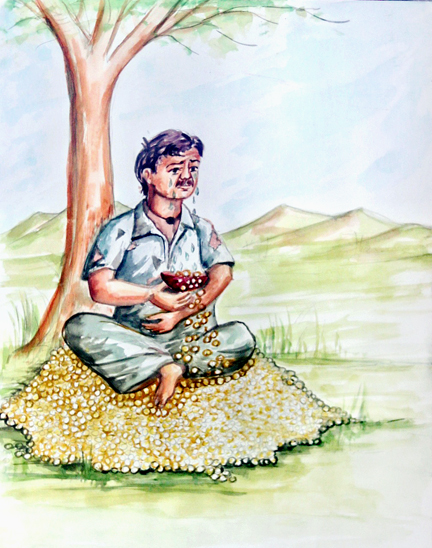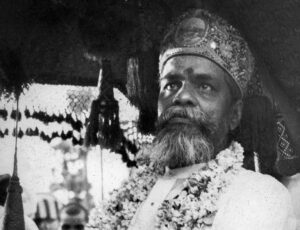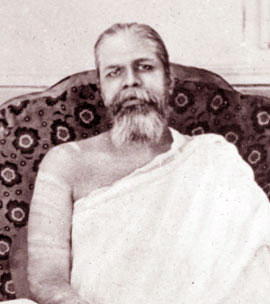by Ananadraj Prabhu | Aug 13, 2020 | English

(Illustration: Govinda Joshi)
There was once a guru who had taught his shishya to be happy, always. Even though he had been poor, he never shed a tear, never was unhappy.
Understandably, people were jealous of this man. How could he be always happy? One of his friends, who was never happy to see him always happy, presented him with a ‘magic cup’ and told him that if he wept into the cup, his tears would turn into pearls.
That changed all. He started finding ways to make himself unhappy, so that his tears could make him rich. As the pearls piled up, so did his greed grow.
His guru, on his return from a pilgrimage, to his utter dismay, found his favourite shishya sitting on a mountain of pearls, weeping helplessly into the bowl. People also informed him that the man, in his desperate attempt to find ever new ways of being unhappy, had also murdered his own kin and wept his heart out so that he produced enough tears to add to the pile of pearls.
The guru, naturally, was greatly pained to hear all this. Ordering the shishya to get down from the mountain of pearls, he gave him a sound dressing down. ‘You are an idiot,’ roared the guru. ‘You could have enjoyed all this wealth without being unhappy. There was no need to shed real tears. You could have just kept on smelling onions. That would have served the purpose. There would be enough tears and lots of pearls. And, you would have remained the same ‘happy man’ that you were.
Only a true guru can give such an advice. To all of us, who, like the man who effortfully cried in order to produce pearls of tears, our sadguru – Shri Martand Manik Prabhu Maharaj, chastises in the sternest fashion – ‘बंध मुगति नहीं ब्रह्म तू साचा क्यों रोता रंडा’ (for you, neither is there bondage, nor liberation; then, why do you make yourself miserable, when YOU are verily the Brahman – the inexhaustible source of all happiness). Always forgetting that happiness is ‘intrinsic’ to our nature, we tend to find newer ways of being unhappy, shedding tears, in the greed that we may have pearls of material happiness.
How fortunate we are, to have a sadguru like Shri Martand Manik Prabhu Maharaj, who always comes to our rescue in our times of despair and dilemma, with a reassuring advise to treat the maya like an ornament and wear it gracefully without allowing it, instead, to become a noose around our neck – तव भूषण ही माया, तुज मंगल शुभ हो.
So, the next time someone presents you with a ‘magic cup’, just remember your guru, and, instead of shedding tears of grief, look for an onion peel.
by Ananadraj Prabhu | Aug 4, 2020 | Uncategorized

Today the world is grappling with an unprecedented medical emergency, which has activated the most primal instinct of the human race – survival, pushing everything else into oblivion.
शरीरे जर्जरीभूते व्याधिग्रस्ते कलेवरे|
औषधं जाह्नवीतोयं वैद्यो नारायणो हरिः||
The above Sanskrit shloka rightly equates a doctor or a vaidya to God himself. There cannot be a more opportune time to experience the truth in the above Sanskrit verse, when doctors are out to save our lives risking their own.
A guru is also, in a sense, a divine healer of worldly maladies (योगीन्द्रमीड्यं भवरोगवैद्यं). We find an interesting incident of the divine healer donning the physician’s garb in the biography of Shri Shankar Manik Prabhu Maharaj – the fourth acharya of Shri Prabhu Peetha Parampara. A law graduate from Osmania University, Shreeji was a man of diverse interests. While subjects like philosophy, literature, and astrology fascinated him, he had a special liking and love for medical science and ayurveda. He thought it was more worthwhile studying ayurveda than any other subject, considering the lack of medical facilities and doctors in and around Maniknagar during his time.
His doors were always open to the sick and ailing who came seeking for his medical advice, any time of the day or night. One day, as maharaj ji was performing his evening anushthaan, news came in that one of the archakas of Shri Prabhu, was seriously ill. Putting an abrupt end to his puja, he expressed his desire to visit the archaka’s house. This, according to his secretaries and assistants, was a serious breach of protocol, as the incumbent head of the Samsthan could never visit anybody’s house uninvited. Putting humanity before protocol, Shri Maharaj ji headed straight to the Brahmin’s house, with a few attendants and holding a medical kit in his hands. It needs hardly be mentioned that the archaka got the gift of life due to Shreeji’s timely medical help.
This story inspires us today, more than ever, to respond to the call of humanism and do whatever we can, to help people around us tide over one of the most difficult times in human history.
by Ananadraj Prabhu | Aug 1, 2020 | English

How do you identify a real saint? What are his essential qualities? We often commit the unpardonable blunder of mistaking a man behaving like God for a saint; whereas, in reality, it is the other way round. A saint is God himself trying to behave like a man. In other words, saints are the closest we come to God on earth, exemplifying the highest human virtues of kindness, compassion, piety and humility. Simplicity is another inseparable attribute of a saint. Shri Shankar Manik Prabhu Maharaj was an embodiment of all this and more.
He donned the exalted mantle of the peethadhipati of Shri Manik Prabhu Samsthan after the maha-samadhi of his Guru and maternal Uncle Shri Martand Manik Prabhu. The change of role from acting as the Secretary of the Samsthan to heading the spiritual mission of Shri Prabhu was not an easy one. It was indeed a challenging assignment that he accepted with all humility, and as the will of Shri Prabhu.
Shreeji was an example of how simple and unassuming a person on a high spiritual platform could be, unlike the gurus and god-men of today, who try to impress people with an ostentatious display of outward simplicity. Shreeji’s simplicity was grounded in his belief in humanity. Even though the exigencies of his office demanded a respectable distance between him and the common masses, he connected remarkably well with everyone around him – his family, his devotees and his associates in the administration of the Samsthan, in his own affable way.
As the guru and head of the Samsthan he interacted with hundreds of people on an everyday basis, making everyone feel equally at home. Stories of his social connect, of how he caringly nurtured a personalized relationship with all those around him are numerous.
The Deshmukhs of Krishnapur (a small village in today’s Telangana, tucked into the agriculturally prosperous lateritic plains surrounding Bidar) are among those families that came into the fold of Shri Prabhu Sampradaya during the time of Shri Martand Manik Prabhu Maharaj and remained inseparably attached to the Samsthan for generations. Anna Saheb and Nana Saheb were two brothers from the Deshmukh family of Krishnapur, who, through their sheer dedication for the cause of Shri Prabhu and his mission, had earned the love and affection of Shri Martand Manik Prabhu Maharaj. Both the brothers were enthusiastic volunteers for the Samsthan. Being roughly of the same age, and sharing his progressive vision, they became close companions to Shri Shankar Prabhu, assisting him in all possible ways and being with him in good and bad times while he worked as the Secretary of the Samsthan. In this way, they remained his closest confidants, both during his stint as the Secretary of the Samsthan and even after he took over as the head of Shri Prabhu Samsthan after Shri Martand Prabhu’s maha-samadhi.
It was a cold December night of 1941. In Maniknagar, the annual Datta Jayanti Mahotsava was drawing to a close with the Prabhu Jayanti Darbar in progress. Shri Shankar Manik Prabhu Maharaj was seated on the divine simhasan (spiritual seat) of Shri Prabhu. He was patiently meeting hundreds of devotees who were standing in queues for the whole night amidst the biting cold to have his darshan. In the middle of the darbar, a shocking news came that Nana Saheb Deshmukh of Krishnapur, who was not keeping well for some time, had passed away. This was an absolutely disturbing news for Shreeji, both personally and otherwise. Nana Saheb had been a pillar of support to the Samsthan and a very dear friend of his. The loss was unfathomable.
Shreeji somehow rushed through the celebrations and asked his personal attendants to prepare for his journey to Krishnapur the next evening after all the devotees and guests who had gathered for the Datta Jayanti celebrations had left Maniknagar for their homes. This, for the officials of the Samsthan, was not in keeping with the conventions, as they had not seen the presiding head of the Samsthan attend anybody’s funeral or visit anyone personally to pay his condolences. This would be a clear breach of protocol. A fierce discussion broke out between Shreeji and the muntazims of the Samsthan as to the propriety of his intended ‘personal visit’ to Krishnapur to pay his condolences to the bereaved family. But Shreeji’s resolve was as solid as rock. Nothing would deter him from changing his mind. Justifying his position, he said, “For me, people are more important than any rule or precedent. I am as ‘human’ as all of you. I too have feelings and emotions. Nana dedicated his life for Shri Prabhu’s cause. It would be grossly ungrateful of me not to be with the family in their hour of grief. Even Adi Shankaracharya broke his vows of sanyasa dharma to perform the last rites of his mother. So, please do not come in the way of my duty.” Nobody dared to counsel him further.
With a few assistants, such as Hanumant Rao muntazim, Nathraja of Sagroli, his personal attendant Ambaji and Driver Nabi, Shreeji drove straight to Zaheerabad in his steel-grey Hudson. As he crossed Zaheerabad and reached Ranjol, he was informed that the road ahead was not motorable as a small stream in the way, which did not have a culvert, was overflowing. This impediment too could not dampen Shreeji’s resolve. Dumping the car at Ranjol, he decided to walk the remaining distance. The Deshpande of Ranjol, who was also a devotee of Shri Prabhu, came up with necessary help like providing sticks and gas lanterns for this rather difficult mid-night trek. The Deshmukh family was speechlessly overwhelmed to have Shreeji in their midst to express his feeling of grief and solidarity. By day-break Shreeji was back in Maniknagar, again, to carry on with his duties as the head of the Samsthan. Words can never express Shreeji’s thoughtfulness.




Recent Comments